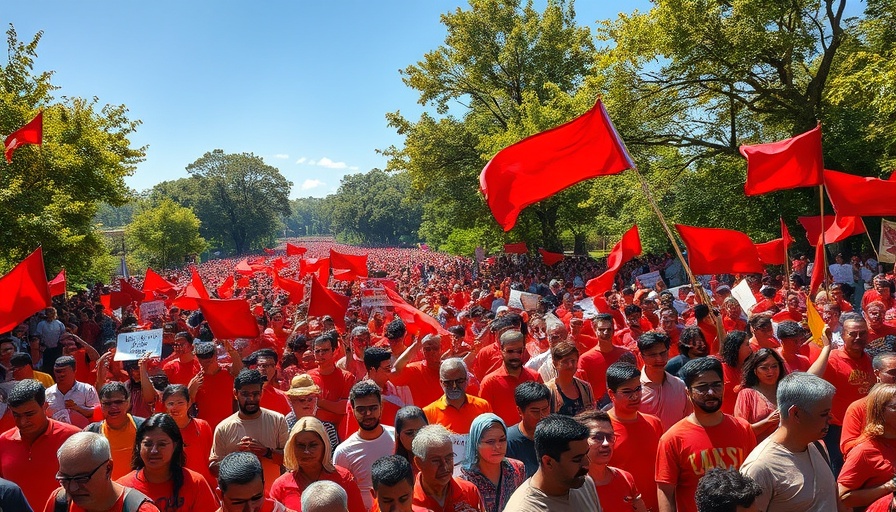
EFC Leads the Charge for VAT Change Ahead of Budget Allocations
In a bold display of political strategy, the Economic Freedom Fighters (EFF) are set to present a 'VAT victory march' in Pretoria as a prelude to Finance Minister Enoch Godongwana's upcoming Budget Speech. Scheduled for Monday morning, this march marks a critical point for the EFF, celebrating what they perceive as a significant achievement: the temporary halt of a proposed hike in the Value-Added Tax (VAT) rate. This halt, enforced by a suspension from the Western Cape High Court, resulted from a legal challenge mounted by the EFF and the Democratic Alliance (DA), highlighting the intense political factionalism shaping South Africa's economic landscape.
The Legal and Political Landscape Influencing VAT
The EFF's assertion that the parliamentary adoption of the fiscal policy framework was unlawful underscores a broader narrative surrounding the governance framework in South Africa. This political tension is amplified as the country gears up for the 2024 general elections, with coalition dynamics intensifying between the ANC, DA, and EFF. Political realignments influenced by past leaders, such as Jacob Zuma and Cyril Ramaphosa, continue to impact public sentiment and stability. This influence is key as the public remains engaged in discussions about economic policies affecting their daily lives.
Public Response and Implications of the VAT March
The EFF's demonstration is anticipated to draw considerable public interest, especially from those who see the VAT increase as detrimental to low-income households. With the streets of Pretoria, particularly those around the Union Buildings and National Treasury, set to be affected, the march symbolizes a communal push against perceived austerity measures. EFF leader Julius Malema has been vocal about the party's position, framing this victory as not just a political statement but a rallying cry for the marginalized voices in South African society. Many view such actions as essential to instigate governmental accountability and reinforce public engagement regarding economic policies.
What This Means for Economic Policy in South Africa
This march signifies more than just a protest; it is an indicator of the shifting paradigms of economic policy that South African citizens must navigate. As proposed reforms face more scrutiny, specifically relating to fiscal policy, the importance of transparency and accountability within the political structure is emphasized. Analysts suggest that initiatives like the National Health Insurance (NHI) and educational reforms may come under further public and political scrutiny as the EFF seeks to highlight their commitment to service delivery amidst rising costs of living and growing income inequality.
Challenges Ahead for the EFF and Opposition Parties
For the EFF, while this march represents a victory, challenges remain. The ongoing dynamics between coalition parties, particularly with the ANC and DA, call for tactical political maneuvering. Furthermore, with the looming 2024 elections, establishing a strong voter turnout remains a priority for opposition factions looking to reshape South Africa’s political landscape. The narrative of an 'anti-poor' VAT increase further positions the EFF to attract votes from disillusioned citizens seeking change, emphasizing the essential role that opposition parties play in shaping public policy and attracting engagement.
Looking Forward: Predictions in a Shifting Political Climate
As South Africa approaches significant electoral milestones, the implications of movements like the VAT march resonate beyond a single protest. They initiate a discourse around electoral integrity and the role of civil society engagement in holding the government accountable. Calls for intricate reforms surrounding areas such as public sector integrity, income inequality, and economic opportunity will likely escalate, fostering an environment where the implications of policies, such as VAT changes, face rigorous public examination by both citizens and political parties alike.
In conclusion, the EFF's march serves as both a celebration and a rallying point, echoing broader themes of economic justice and accountability. As citizens navigate the complexities of governance, understanding the intricate relationship between economic policies and social outcomes will be crucial. This upcoming Budget Speech will be pivotal, potentially altering the course of economic discourse in the country.
As we continue to monitor economic policies and their social impacts, engagement through informed discussions becomes essential. Whether it’s participating in marches or voicing concerns to local representatives, every bit of civic engagement contributes to shaping the future of governance in South Africa.
 Add Row
Add Row  Add
Add 




Write A Comment